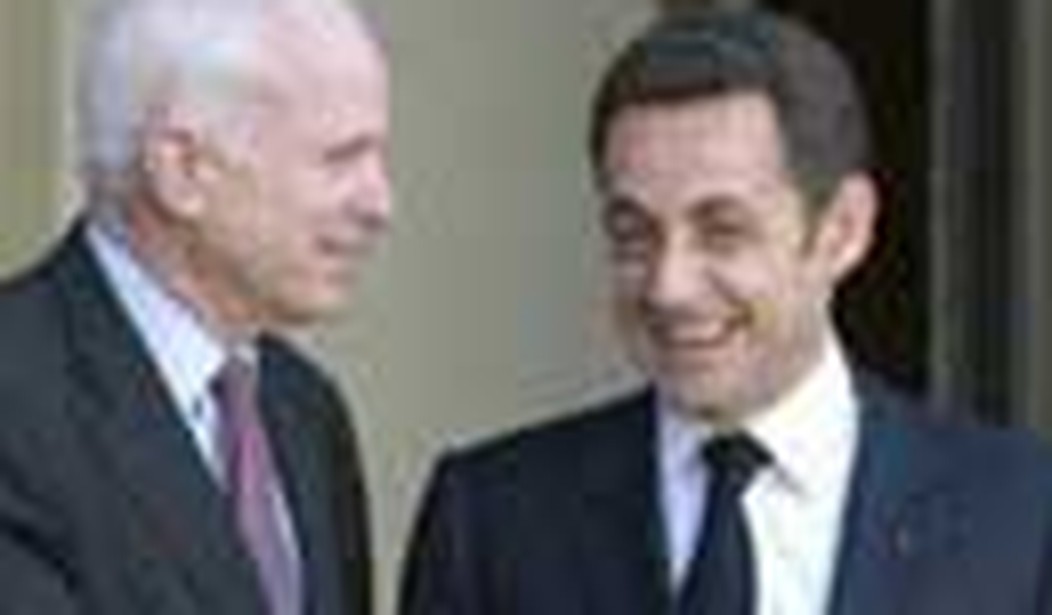John McCain traveled the world last week — visiting Iraq, Jordan, Israel, France and Great Britain — hoping to demonstrate to voters at home his foreign policy chops and to people abroad his intent to repair damaged alliances. Seizing upon McCain’s remark that Iran trains Al Qaeda operatives. the media missed the bigger story: the largely positive reception that McCain received overseas. Rather than confirm to the world that he is the scary right-winger many of them envisioned, McCain instead reassured his hosts that his presidency would be markedly different than the current one.
McCain racked up positive reviews nearly everywhere he went. Previewing his trip with a column in the Financial Times, he stressed the importance of strong Europe-American alliances and “welcome[d] European leadership to make the world a better and safer place.” The first stop on McCain’s trip was to meet with Prime Minister Gordon Brown of Great Britain, fitting, seeing that last year, a Pew poll found that only 51% of British respondents viewed the United States favorably, down from 83% a year before the war in Iraq. Of his visit, the left-wing Independent allowed that “a McCain brand of hawkishness is likely to be less inflexibly, and ignorantly, ideological than George Bush’s.” Even the viciously anti-American Guardian advised its readers that “Mr. McCain should not be dismissed as Bush mark two” because he is “made of sterner stuff and he has a lifetime of engagement with the outside world — and the scars to prove it — that gives him the moral seriousness Mr. Bush so lacks.” While lamenting that “the next president may be neither black nor a woman,” the paper praised him for being “wholly clear about the need to rebuild America’s reputation in the world and about the importance of treating allies seriously.” McCain received even more glowing press in Israel and France.
Given the baggage of the current Republican administration, McCain may be hesitant to make that the case that he will be more adept at leading the world than Obama, whose entire candidacy is predicated upon the unsubtle promise that his mere presence in the White House will make the world love us again. The Illinois Senator’s supporters vastly overestimate the degree to which he will be able to restore America’s prestige in the world. Hope that Obama will be a salve for the country’s reputation is largely unfounded, based as it is as much upon his race as his proven leadership abilities. Last year, in a cover story for The Atlantic, Andrew Sullivan breathlessly asked, “What does he offer? First and foremost: his face. Think of it as the most effective potential re-branding of the United States since Reagan.” The shallow supposition that Obama’s mixed-race heritage will win over the people of the word belies a dangerous naïveté about the region in which America most requires effective public relations: the Middle East. Far from being a racially enlightened paradise where the election of a black president would cause spontaneous celebration in the streets, Arab and Muslim countries are actually among the most racist in the world. For decades, they countenanced the Arab slavery of black Christians in the Sudan and, today, do nothing about genocide against blacks in Darfur. Whenever Condoleezza Rice travels to the region she is trailed by Arab newspaper cartoons depicting her as a monkey.
The truth is that much of contemporary anti-Americanism is a manifestation of disgust with George W. Bush as an individual and will immediately dissipate as soon as a new president — Democrat or Republican — enters the Oval Office in 2009. Yet also keep in mind that a similar degree of anti-American sentiment is inherent and may take a generation to disappear. French anti-Americanism, for instance, springs from economic inferiority and a lost empire, was flaunted as far back as 50 years ago when Charles de Gaulle was president and George W. Bush was but a little boy. Much of South America’s anti-Americanism stems from 19th century American imperialism, something that no American president will be able to change.
What the next president can do to reverse the popularity deficit is distinguish himself from the current administration’s most unpopular policies. On this score, McCain already has much to his credit. He has long stood out for his proactive stance on global warming, his opposition to coercive interrogation practices of terrorism suspects, and his support for closing the prison on Guantanamo Bay, all things which anger people and governments overseas. Moreover, it is these very issues — and not America’s continued presence in Iraq, a policy with which McCain is readily identified due to his support for last year’s troop surge – that accounts for America’s low approval ratings around the world. The initial decision to overthrow Saddam Hussein was obviously unpopular, but it is unclear whether an American withdrawal – and the likely chaos that would follow – would make us more loved overseas. In this sense, McCain’s record of criticizing the Bush administration’s handling of the war and his dedication to seeing Iraq through to some sort of democratic peace are both factors that will boost America’s standing should he become president.
When electing a president, Americans do not usually prioritize international opinion. In 2004, for instance, the world hoped that we would elect John Kerry; the Guardian even went so far as to encourage its readers to send letters to pen pals in the swing state of Ohio encouraging American voters to do so. But in this presidential campaign, America’s role in the world has taken on significance unseen in recent political history. A top concern for voters in November will be a candidate’s ability to raise American prestige. Rest assured that McCain will do just that.
James Kirchick is an assistant editor of The New Republic.









Join the conversation as a VIP Member